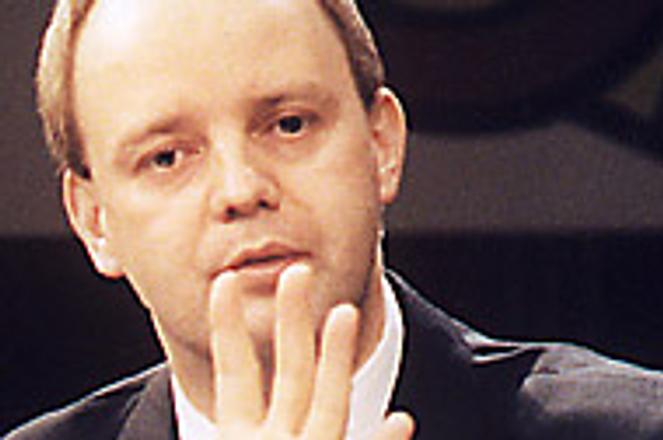Pavol Rusko, owner of Slovakia's most popular station, TV Markíza, has said calling a special number convinced him his phone was bugged.photo: TASR
The private TV station Markíza ran a recent news report claiming to offer viewers a means of checking if their mobile phones were bugged.
According to the March 14 and 15 reports, mobile owners had only to dial #31#0017604330002, and then wait: if they heard a long beeping signal, their phone was bugged. If they received a 'wrong number' signal, they were in the clear.
The response from experts and mobile operators was as swift as it was derisive. Representatives of the Slovak secret police (SIS) - the only Slovak body legally allowed to tap phones - called the report "technical gibberish". Eva Güttlerová, spokesperson for Slovak mobile phone operator Globtel, added: "This report was absolute nonsense."
Markíza reporter Henrich Krejča, who put together the material, said his team had decided to run the story based on information from "well informed technicians close to [monopoly fixed line operator Slovak] Telecom". Markíza head Pavol Rusko said March 21 that he had personally known of the number for over three months.
"We obtained our information from former SIS employees and from members of the opposition media," he said. "When we [Markíza staff members] tested the number before the news was aired, some of us heard the long tone. My tone was long as well," he added, suggesting that his phone was bugged.
But Globtel Director Pavol Lančarič warned callers not to dial the number, saying that it was impossible to check the 'bugged' status of a mobile phone by making a call.
Users who did place calls (Globtel reported a 120% increase in international calls after the Markíza reports) had been calling an ordinary number in the San Diego, California area, Lančarič said, adding that users would be billed for a standard international phone call. After the heavy increase, Globtel decided to "donate the profits from these calls to charity."
"A good trick"
By far the most popular TV station in the country, Markíza was accused of irresponsibility and misleading the population after the report aired.
"This was a good trick by Markíza, which likes to attract viewers with sensational information," said Grigorij Mesežnikov from the Bratislava-based think tank Institute for Public Affairs. "It was not a correct thing to do. Markíza obviously cannot prove that the number really does what they say it does."
While no phone operators planned to sue Markíza for the allegedly erroneous information, Globtel's Güttlerová said she was concerned with the way "misleading and powerful information like this was prepared".
"After the first report was aired on March 14, we invited Mr. Krejča to Globtel so we could explain some technical matters that he should have understood," she said. "But he just wouldn't listen, and instead asked what our point was."
Krejča said that in his second report aired March 15, he relayed the information Globtel had given him. He added that Markíza would not apologise for the story. "We don't feel we should," he said.
"We have done everything to make sure that the news informed the public," Rusko said. "In the report, we warned viewers that the number could be a trick number intentionally spread by some phone operators to gain commercial profit."
Politicians bugged?
During the Markíza segment, it was reported that "many times in the past, politicians and businessmen have expressed concern that their telephones were bugged".
Members of the current opposition parties Movement for Democratic Slovakia (HZDS) and Slovak National Party have expressed the belief that their phones were tapped, such as HZDS member of parliament Ján Cuper and former Speaker of Parliament Ivan Gašparovič.
Robert Fico, head of the Smer (Direction) party, which according to opinion polls is the second most popular party in Slovakia behind the HZDS, has also said that his phone was bugged. "I think it's completely normal in Slovakia for phones to be bugged," he said in October last year.
Rusko agreed. "We all know it's happening, even without [the SIS] going through the necessary legal requirements."
To bug someone's telephone, a series of legal documents and requests is required: a court order, a prosecutor's order, and other documents from the investigative and judicial organs involved. According to the SIS's Vladimír Šimon, the secret police "never bug telephones illegally".


